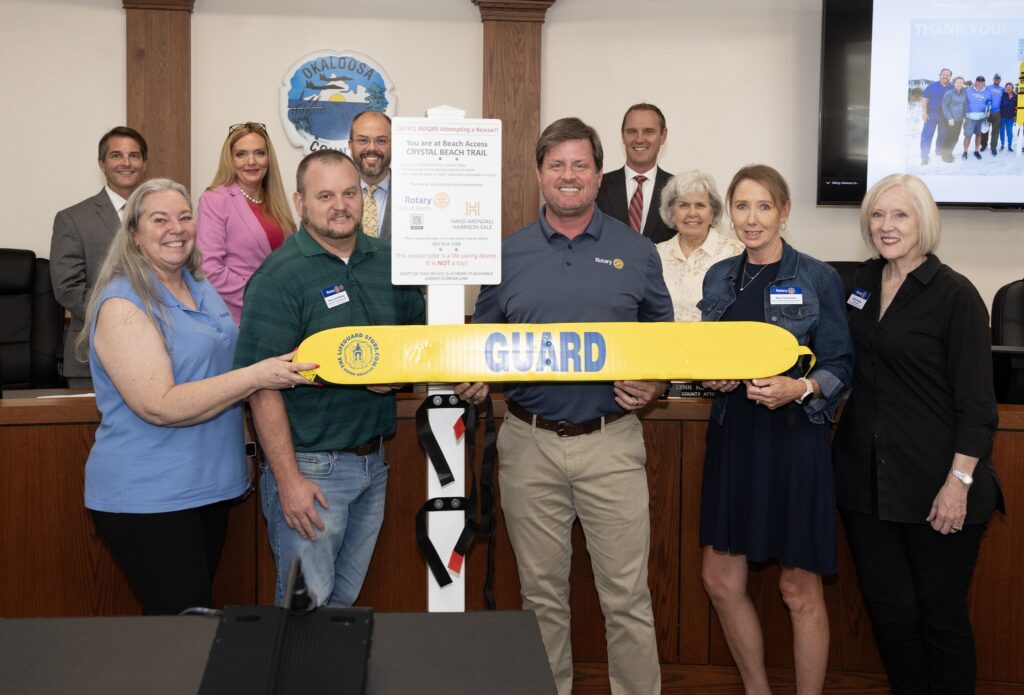
🌊 Rescue tube stations could soon expand to Okaloosa County beaches under a Rotary-led initiative.
🛟 The flotation devices cost about $245 each and have already been credited with more than 200 rescues nationwide.
🤝 Commissioners gave unanimous consent for staff to begin drafting an agreement with the Destin Rotary Club.
CRESTVIEW — A proposal to expand the use of rescue tubes along Okaloosa County beaches drew support Tuesday as the Destin Rotary Club presented its case before commissioners.
Commission Chairman Paul Mixon introduced the item and quickly placed it on the consent agenda, allowing for a formal presentation.
Dion Moniz, speaking on behalf of the Destin Rotary, told commissioners the project builds on a pilot program that has already shown results in reducing drownings.
“The Public Rescue Tube Project is designed to save lives by providing flotation devices that are easily accessible to beachgoers in distress,” Moniz said.
Rescue tubes, he explained, are simple flotation devices mounted on posts near the waterline. Unlike lifeguard towers, which are limited in number and costly to staff, the tubes can be deployed across more areas, providing swimmers and bystanders with a quick tool in emergencies.
“We have seen in our pilot program that these tubes make a real difference,” Moniz said. “They allow immediate action before first responders arrive.”
Moniz framed the proposal with global and statewide data.
“There’s an estimated 236,000 drownings per year worldwide. It’s the third leading cause of unintentional death worldwide. It’s the number one cause of death in children aged one to four,” he said.
According to Moniz, “there’s over 600 of these tubes that are currently in use,” with “over 200 known rescues,” and “100% of those rescues have all been successful … zero rescuer deaths when using these tubes.”
Moniz pointed to a 25-year study by the Hawaii Department of Health that showed rescuer deaths decreased from 60% to 13% over the study period, with no reduction in areas without tubes, and a 100% reduction in deaths in regions with the tubes.
Each station costs approximately $245 to install, including a 12-foot post with sleeve and cap, signage, and hardware, according to the Rotary materials.
Routine maintenance involves checking every four to six weeks, conducting additional inspections during storms and peak tourism periods, and posting a number for citizens to report problems. Moniz said the clubs also plan to leave spare tubes with county beach safety so replacements can be swapped in quickly if a unit is stolen or damaged.
Moniz described the physical setup and durability: a 10-foot post buried about four feet in wet sand with a white sleeve for aesthetics.
“These things are pretty hurricane-proof. Like I said, when there’s some four feet down in the sands, they withstand hurricanes, believe it or not,” Moniz said.
He added that even non-swimmers can deploy a tube to a victim, including by drone, as seen in a recent rescue that occurred on Pensacola Beach.
The program relies on local partners. “What we do is we partner with businesses, local businesses … We sell sponsors such as $500 so that we can encourage businesses to be involved,” Moniz said, noting signage includes access-point information and a reminder to call 911.
Rotary clubs across the Panhandle have already installed stations: Navarre (16), Perdido Key (4), Pensacola Beach (5), Panama City Beach (10, Phase 1), Bay County (10, Phase 1), Destin (8, Phase 1), Eglin Air Force Base (2) and Walton County (58, multi-phase). Okaloosa County is listed as “TBD.”
Commission Chairman Paul Mixon signaled support for the program, saying, “It’s a great project. I’m glad y’all are taking it on.”
With unanimous support on the commission’s consent agenda, county staff will begin working on an agreement, with a formal presentation to be given at a later date.
Register or login with Mid Bay News and never get another pop up on our site!